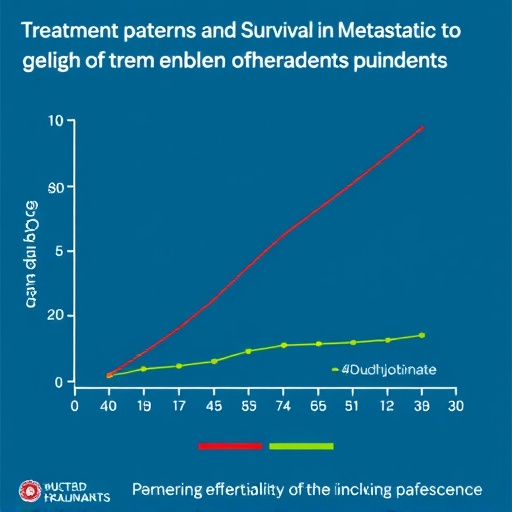In the complex landscape of metastatic adenoid cystic carcinoma (ACC) of the head and neck, researchers face a significant challenge: the absence of a standardized systemic therapy regimen. This rare malignancy, known for its insidious progression and resistance to conventional treatments, demands a closer examination not only of therapeutic approaches but also of survival outcomes. A groundbreaking study recently published in BMC Cancer sheds new light on real-world treatment patterns in this patient population and uncovers critical survival trends that may steer future clinical decisions.
The investigative team conducted an extensive retrospective review encompassing nearly two decades, from January 2005 to December 2023, analyzing data from 51 patients diagnosed with metastatic ACC of the head and neck. Their goal was to identify prevailing treatment strategies and correlate these with patient survival metrics in a clinical setting removed from the controlled environment of clinical trials. The study’s findings contribute a vital piece to the puzzle of managing metastatic ACC, a field marked by heterogeneity and therapeutic ambiguity.
From the patient cohort, it was observed that 70.6% had undergone systemic therapy, highlighting a tendency to pursue pharmacologic intervention despite the absence of consensus on treatment protocols. Median overall survival for the total cohort was approximately 29 months, a figure that underscores the aggressive nature of metastatic ACC but also establishes a benchmark for assessing therapeutic efficacy.
One of the most compelling revelations of the study was the substantial survival advantage conferred to patients harboring lung metastases. These individuals exhibited a median overall survival of 44.5 months, markedly longer than the 11-month survival observed in patients whose metastatic spread involved other sites. This striking contrast suggests that metastatic location plays a pivotal role in prognosis and may influence therapeutic responsiveness.
The study further delved into the dynamics of systemic treatment, evaluating the progression-free survival (PFS) across sequential lines of therapy. For patients receiving first-line systemic treatment, the median PFS was nearly eight months. However, the efficacy diminished with subsequent treatment lines—dropping to around six months for second-line and just over four months for third-line therapies. Such data reflect the diminishing returns of systemic interventions in metastatic ACC and highlight the urgent need for novel therapeutic agents.
An additional insight from the analysis was the predominant reason for discontinuation of systemic therapies across all lines: disease progression. This pattern underscores the relentless advancement of metastatic ACC despite pharmacological efforts and emphasizes the challenge clinicians face in achieving durable disease control.
The patient management landscape painted by this research is one of heterogeneity, where treatment approaches vary widely and no singular standard has emerged. This heterogeneity likely stems from differences in tumor biology, metastatic burden, prior treatment history, and patient factors, all of which complicate the design of effective, universally applicable treatment algorithms.
The significant survival advantage seen in patients with lung metastases invites speculation about underlying biological mechanisms that may render pulmonary metastatic disease more amenable to current therapeutic modalities. It also raises questions about the potential role of localized treatments in combination with systemic therapy to improve outcomes for patients with metastases in other anatomical sites.
Given the median overall survival of just over two years in the broader cohort, the findings highlight the imperative for continued clinical research focused on targeted therapies, immunotherapeutic approaches, and personalized medicine paradigms. The development of molecularly driven treatments could potentially transform this grim prognosis into a manageable chronic condition.
Moreover, the study’s comprehensive dataset spanning nearly two decades provides a valuable real-world perspective, contrasting with the often narrow inclusion criteria of clinical trials. This inclusivity enhances the applicability of findings to diverse patient populations encountered in everyday clinical practice.
The research also underscores the importance of vigilant longitudinal monitoring in metastatic ACC patients, enabling timely adjustments in therapy in response to disease progression. The relatively short progression-free intervals across treatment lines necessitate dynamic treatment planning and an adaptable therapeutic arsenal.
While the study did not identify a definitive treatment pathway, its findings contribute essential knowledge toward crafting evidence-based guidelines in the future. Collaborations across oncology centers and the establishment of international registries could accelerate progress by pooling patient data and fostering multicenter clinical trials.
In conclusion, patients with metastatic head and neck ACC face a challenging journey marked by variable treatment responses and relatively limited survival. However, the newfound association between lung metastases and improved outcomes offers a beacon of hope, guiding researchers toward tailored therapeutic strategies. The study accentuates the pressing need for innovative research to overcome therapeutic resistance and improve quality of life for patients afflicted with this formidable cancer.
As the oncology community awaits breakthroughs, integrating multidisciplinary care, including surgical interventions, radiation, and systemic therapies, remains paramount. Enhanced understanding of the molecular and immunologic landscape of ACC will be critical to unlocking new therapeutic avenues that could reshape prognosis for future patients.
Ultimately, this pivotal research serves as both a reflection on current limitations and a clarion call for intensified scholarly focus on metastatic adenoid cystic carcinoma. Through sustained scientific inquiry and clinical innovation, the goal of standardized, effective treatment regimens may soon become attainable for this challenging malignancy.
Subject of Research: Treatment patterns and survival outcomes in metastatic head and neck adenoid cystic carcinoma.
Article Title: Real-world treatment patterns and survival outcomes in metastatic head and neck adenoid cystic carcinoma.
Article References:
Bölek, H., Kayaalp, M., Şahin, T.K. et al. Real-world treatment patterns and survival outcomes in metastatic head and neck adenoid cystic carcinoma. BMC Cancer 25, 1451 (2025). https://doi.org/10.1186/s12885-025-14884-5
Image Credits: Scienmag.com
DOI: https://doi.org/10.1186/s12885-025-14884-5





